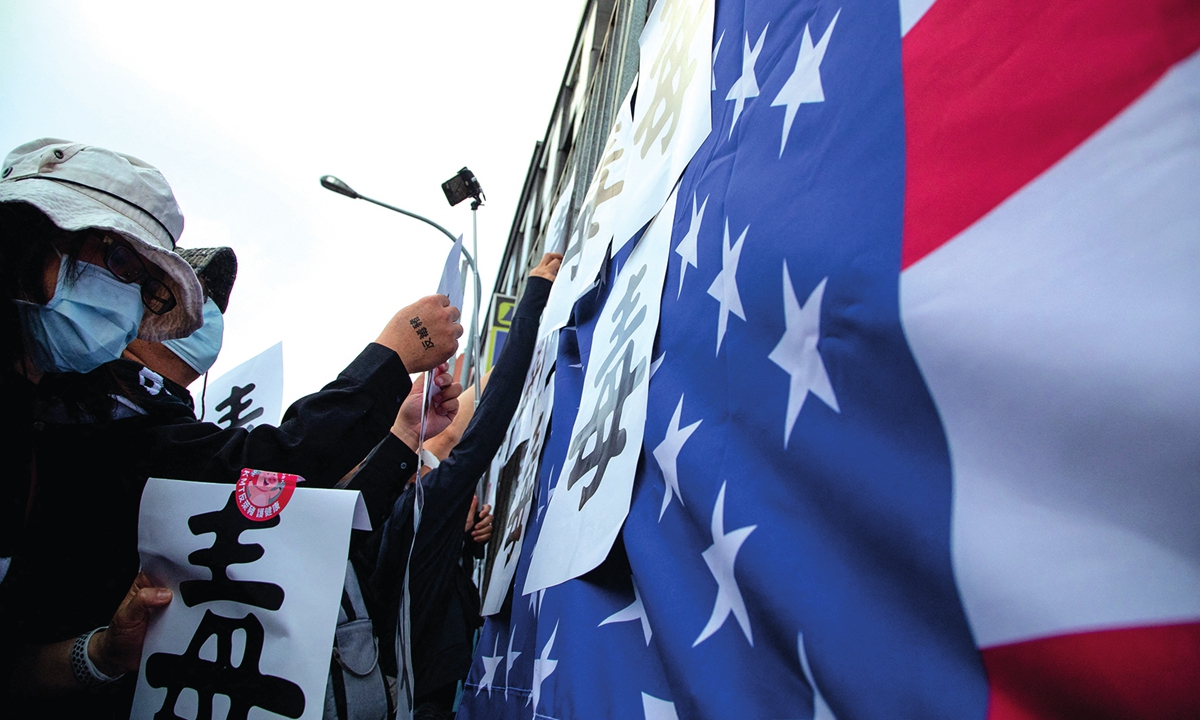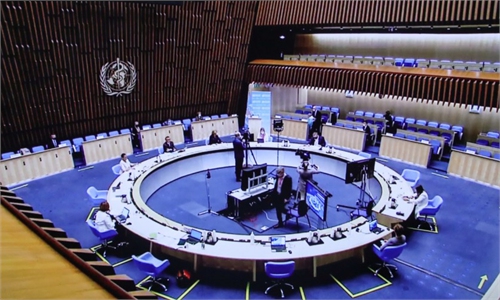
People in Taiwan stick the signs that read "Poison" on the American flag in front of DPP's headquarters during a protest in Taipei on November 22, 2020. Photo: AFP
Claiming its one-China principle is different from China's, the US is only retreating from its own promises and the common ground it reached with China, with the intention of obstructing China's peaceful reunification and attempting to build Taiwan into an "unsinkable aircraft carrier," Chinese Foreign Ministry spokesperson Wang Wenbin said on Monday at a press briefing in response to remarks from US Department of State spokesperson Ned Price on the one-China principle.
Price said on Twitter on May 21 that China "continues to publicly misrepresent US policy. The US does not subscribe to the PRC's 'one-China principle' - we remain committed to our longstanding, bipartisan one-China policy, guided by the Taiwan Relations Act, Three Joint Communiqués, and Six Assurances."
Responding to Price's remarks, Wang said it is a distortion of history and facts. The Taiwan question is the most important and sensitive topic in China-US relations, with the one-China principle at the core.
Wang reiterated that there is but one China in the world, and Taiwan is a part of it. The government of the People's Republic of China is the only legitimate government representing China, a consensus reached by the international community and a basic norm of international relations.
At the UN plenary session on October 25, 1971, Resolution 2758 was passed. This recognized the one-China principle and made it clear that the government of the PRC is the only lawful government representing the whole of China, including Taiwan.
There are 181 countries including the US that have established diplomatic relations with China on the foundation of recognizing the one-China principle. In history, the Taiwan question has been the largest obstacle to the normalization of China-US relations.
In 1971, the US stated that it was willing to pursue new principles on the Taiwan question, including that it recognizes there is only one China in the world, and that Taiwan is part of China. It also said that the US would not make any future statements that "Taiwan's status is undetermined," and that it would not support any "Taiwan independence" movement.
Confirming these terms with the then-Chinese Premier Zhou Enlai, the then-US President Richard Nixon signed the Shanghai Communiqué, a historic document that became the political foundation for the two countries to establish diplomatic ties.
Two other communiqués later signed in 1978 and 1982 by China and the US both reiterated the one-China principle and related statements.
"These are all written words that are clear and unambiguous, which cannot be erased or denied," Wang said. However, over the past 40 years, the US has not stuck to the principle or the provisions of the Three Joint Communiqués, and the list of such behaviors goes on and on. For example, the US has significantly relaxed the constraints on official contact with Taiwan, and the level and frequency of exchanges between the two sides have increased to a great extent, breaking the US commitment to maintain only unofficial relations with Taiwan.
What's more, the military ties between the two sides are becoming more frequent and open, and the scale of US arms sales to Taiwan is increasing, totaling more than $70 billion, which is in violation of the US commitment to gradually reduce arms sales to the island. The US side has also hyped the expansion of Taiwan's so-called "international space," trampling on its promises that the US has no intention of implementing "two Chinas" or a "one China, one Taiwan" policy.
In recent years, the US has intensified its efforts to confuse the public and to deflate the one-China principle, the spokesperson said. For example, the wording of the one-China policy is getting longer and longer, adding things that China has never recognized or even firmly opposed such as the Taiwan Relations Act and Six Assurances.
"The China-US relationship is a state-to-state relationship that can only be guided by the political consensus reached between two sides, and cannot be built on policies unilaterally concocted by the US side," Wang noted. "Claiming its one-China principle is different from China's, the US is only retreating from its own promises and the common ground it has reached with China with the intention of going backward against history. By making use of the Taiwan question, the US aims at obstructing China's peaceful reunification, undermining peace and stability in the Taiwan Straits, and attempting to build Taiwan into an 'unsinkable aircraft carrier,'" Wang said.
"Without recognizing the one-China consensus, China and the US would never have established diplomatic relations and ties between the two countries would not have developed. The Taiwan question is purely a matter of China's internal affairs. China's determination to defend its sovereignty and security interests is unwavering, and there is no room for compromise or concessions," Wang noted.
China urges the US to return to the right track of the one-China principle, and put into practice US President Joe Biden's statement that the US does not endorse Taiwan independence, Wang said, adding that the US should stop supporting Taiwan secessionists and avoid further damaging China-US relations.
Global Times


